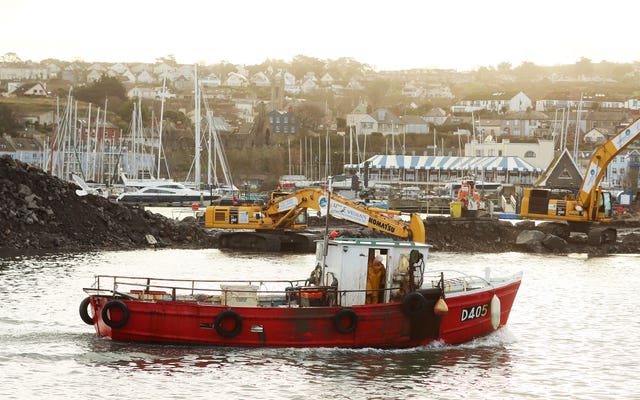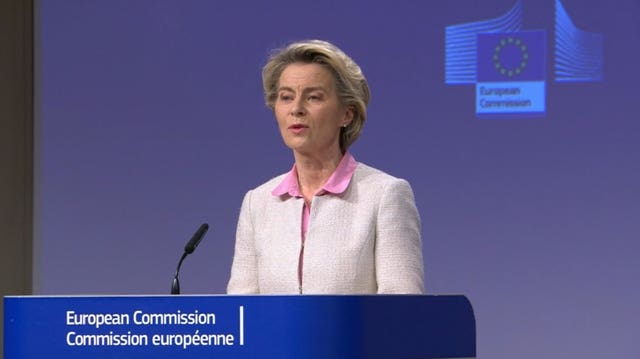
The UK and Brussels have finally agreed a post-Brexit trade deal after nine months of sometimes bitter wrangling – here is what it means.
– What does it mean for the economy?
The biggest thing to come out of the deal is that Britain will not have to end the Brexit transition period at the end of the month on World Trade Organisation (WTO) terms which would have meant tariffs for goods entering and leaving the country.
The UK will now have access to its biggest export market without such levies being imposed.
But many leading economists say the UK’s GDP, a measure of its economic wealth, will be lower outside the EU than if it had stayed a member.
– How are fisheries impacted?
Though a small part of the economy, fishing rights became a totemic tussle between the two sides as the UK saw them as a symbol of its sovereignty.
Britain made concessions as the deadline for a deal loomed, but Prime Minister Boris Johnson insisted the result was that the UK would again be an “independent coastal state with full control of our waters”.
The transition period has been cut to five-and-a-half years from the 14 years first demanded by the EU, and Brussels will reduce its share of the quota by 25%.
 Fishing rights were seen by the UK as a symbol of sovereignty (Brian Lawless/PA)
Fishing rights were seen by the UK as a symbol of sovereignty (Brian Lawless/PA)
– How does it impact on security?
Britain and the EU will continue to co-operate on security and policing issues under the deal agreed with Brussels, although the UK will not enjoy the same level of “facilities” as before.
An EU briefing note said the UK would no longer have “direct, real-time access” to sensitive databases covering freedom, security and justice.
But it said the agreement did include “ambitious” arrangements for the “timely, effective, efficient and reciprocal exchanges” of air passenger details and criminal record information, as well as DNA, fingerprint and vehicle registration data.
– What about the level playing field on competition rules?
This was one of the last major sticking points in negotiations, but London and Brussels have agreed a floor for standards for areas like the environment and labour rights.
There will be a review in four years to ensure the level playing field is working out, European Commission president Ursula von der Leyen said.
 European Commission president Ursula von der Leyen (PA)
European Commission president Ursula von der Leyen (PA)
– What happens with state aid?
Another serious bone of contention in which Britain seemed to get a win.
London will create its own subsidy regime after resisting calls from Brussels to align its state aid rules with the EU.
But Britain must abide by shared principles with the EU in the matter.
– What about how laws are made?
The Prime Minister said that laws will now be made only by the British parliament, and be scrutinised by UK judges, and that the jurisdiction of the European Court of Justice “will come to an end”.
– How does it impact health and state pensions?
UK nationals in the EU will still be able to access healthcare, as will people from member states in Britain.
And the Government said the deal means pensioners who retire to the EU will get an uprating of state pensions.
This deal includes a commitment to maintaining high labour, environment and climate standards without giving the EU any say over our rules. pic.twitter.com/Gx6oOfbmzO
— UK Prime Minister (@10DowningStreet) December 24, 2020
– Will education be affected?
A new worldwide programme will replace the Erasmus scheme which has seen student exchange programmes where people study across the continent, Mr Johnson said.
– Was travel an issue?
The deal provides for “continued and sustainable air, road, rail and maritime connectivity”, the European Commission said.
Passenger rights and transport safety are not undermined by the agreement.
– What does it mean for Northern Ireland?
The deal eases the customs situation for goods going from Britain to Northern Ireland.
Northern Ireland remains in the EU’s single market for goods under the previous Withdrawal Agreement that was meant to prevent a hard border on the island of Ireland.
Under the Northern Ireland Protocol, the region also adheres to EU customs regulations at its ports.



Why are you making commenting on The Herald only available to subscribers?
It should have been a safe space for informed debate, somewhere for readers to discuss issues around the biggest stories of the day, but all too often the below the line comments on most websites have become bogged down by off-topic discussions and abuse.
heraldscotland.com is tackling this problem by allowing only subscribers to comment.
We are doing this to improve the experience for our loyal readers and we believe it will reduce the ability of trolls and troublemakers, who occasionally find their way onto our site, to abuse our journalists and readers. We also hope it will help the comments section fulfil its promise as a part of Scotland's conversation with itself.
We are lucky at The Herald. We are read by an informed, educated readership who can add their knowledge and insights to our stories.
That is invaluable.
We are making the subscriber-only change to support our valued readers, who tell us they don't want the site cluttered up with irrelevant comments, untruths and abuse.
In the past, the journalist’s job was to collect and distribute information to the audience. Technology means that readers can shape a discussion. We look forward to hearing from you on heraldscotland.com
Comments & Moderation
Readers’ comments: You are personally liable for the content of any comments you upload to this website, so please act responsibly. We do not pre-moderate or monitor readers’ comments appearing on our websites, but we do post-moderate in response to complaints we receive or otherwise when a potential problem comes to our attention. You can make a complaint by using the ‘report this post’ link . We may then apply our discretion under the user terms to amend or delete comments.
Post moderation is undertaken full-time 9am-6pm on weekdays, and on a part-time basis outwith those hours.
Read the rules hereLast Updated:
Report this comment Cancel